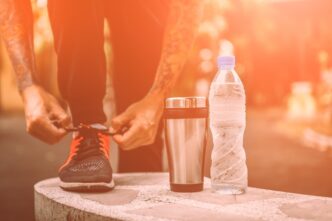A Quick Takeaway
The Story Behind the Trend
How to Make It Work for You
The Community View
Sports drinks, those brightly colored beverages lining supermarket shelves, are formulated to replenish fluids, electrolytes, and carbohydrates, primarily targeting individuals engaged in prolonged or intense physical activity. While marketed as essential for peak performance and rapid rehydration, their necessity is often overstated for the average person. For most daily activities and moderate workouts lasting less than an hour, plain water remains the gold standard for hydration, while sports drinks offer specific benefits only in certain high-demand scenarios.
Understanding Your Hydration Needs
Maintaining adequate hydration is fundamental for all bodily functions, from regulating body temperature to transporting nutrients. Our bodies are constantly losing water through breathing, urination, and sweating, making consistent fluid intake crucial.
During exercise, sweat rates increase significantly, leading to greater fluid and electrolyte losses. The intensity, duration, and environmental conditions (heat, humidity) all dictate how much fluid and what type of fluid your body requires to stay optimally hydrated.
What Exactly Is In a Sports Drink?
Unlike plain water, sports drinks are specifically engineered with a blend of ingredients designed to support athletic performance and recovery.
Electrolytes
The primary electrolytes found in sports drinks are sodium and potassium, with some also including smaller amounts of magnesium and calcium. These minerals are vital for numerous physiological processes, including nerve impulse transmission, muscle contraction, and maintaining fluid balance within cells and tissues.
When you sweat, you lose these essential electrolytes, particularly sodium. Replenishing them can help prevent muscle cramps, fatigue, and even more serious conditions like hyponatremia (dangerously low sodium levels) in extreme cases.
Carbohydrates (Sugars)
Sports drinks typically contain simple sugars like glucose, fructose, or sucrose. These carbohydrates serve as a quick source of energy for working muscles, helping to maintain blood glucose levels during prolonged activity when muscle glycogen stores might be depleting.
Beyond providing energy, carbohydrates in specific concentrations can also enhance the rate at which fluids and electrolytes are absorbed from the gut into the bloodstream. This makes them more effective for rapid rehydration than water alone in certain situations.
Other Ingredients
Most sports drinks also include flavorings and artificial colorings to enhance palatability, making them more appealing to consume, especially when feeling fatigued. While these contribute to the overall experience, they do not offer nutritional benefits.
When Sports Drinks Are Beneficial
Sports drinks have a legitimate place in the hydration strategy for certain athletes and specific types of exercise. Their benefits become most pronounced under particular conditions.
Prolonged, High-Intensity Exercise
For activities lasting longer than 60 minutes, such as marathons, long-distance cycling, intense team sports, or extended hiking, sports drinks can be highly beneficial. In these scenarios, the body’s glycogen stores begin to deplete, and significant electrolyte losses occur through sweat.
The carbohydrates in sports drinks provide a readily available energy source, helping to sustain performance, while the electrolytes aid in preventing dehydration and maintaining muscle function. This combination can delay fatigue and improve endurance.
Hot and Humid Conditions
Exercising in hot and humid environments significantly increases sweat rates and, consequently, electrolyte loss. In such conditions, the risk of dehydration and heat-related illnesses is higher.
Sports drinks can help mitigate these risks by rapidly replenishing lost fluids and electrolytes more effectively than water alone. This is particularly important for outdoor athletes or those working in demanding environments.
When Water is Sufficient (and Preferable)
Despite the targeted marketing, the majority of people engaging in typical daily activities or moderate exercise do not need sports drinks.
Moderate Exercise Sessions
For workouts lasting less than 60 minutes, such as a brisk walk, a light jog, or a standard gym session, plain water is perfectly adequate for rehydration. The body’s natural glycogen stores are usually sufficient for these shorter durations, and electrolyte losses are typically minimal enough to be replenished through regular meals.
Everyday Hydration
For general daily hydration, water is always the best choice. It contains no added sugars, artificial colors, or unnecessary calories. Focusing on water throughout the day supports overall health without the potential downsides of regular sports drink consumption.
Potential Downsides and Considerations
While beneficial for specific scenarios, indiscriminate consumption of sports drinks can lead to several health concerns.
Added Sugars and Calories
Many sports drinks contain a significant amount of added sugars, which contribute to caloric intake. Regular consumption by individuals who are not engaging in intense physical activity can lead to unwanted weight gain, increased risk of type 2 diabetes, and dental erosion.
It is crucial to read nutrition labels and understand that these calories can quickly add up if not balanced with appropriate energy expenditure.
Artificial Ingredients
The artificial colorings and flavorings found in many sports drinks, while generally considered safe, are unnecessary for hydration and can be a concern for some individuals sensitive to these additives.
Making Informed Hydration Choices
The key to proper hydration is understanding your body’s specific needs based on your activity level and environment. For most people, the best strategy involves focusing on water as the primary beverage.
If you are an endurance athlete or engage in prolonged, intense exercise, sports drinks can be a valuable tool. Consider consulting with a sports dietitian to develop a personalized hydration and nutrition plan that supports your performance and health goals.







